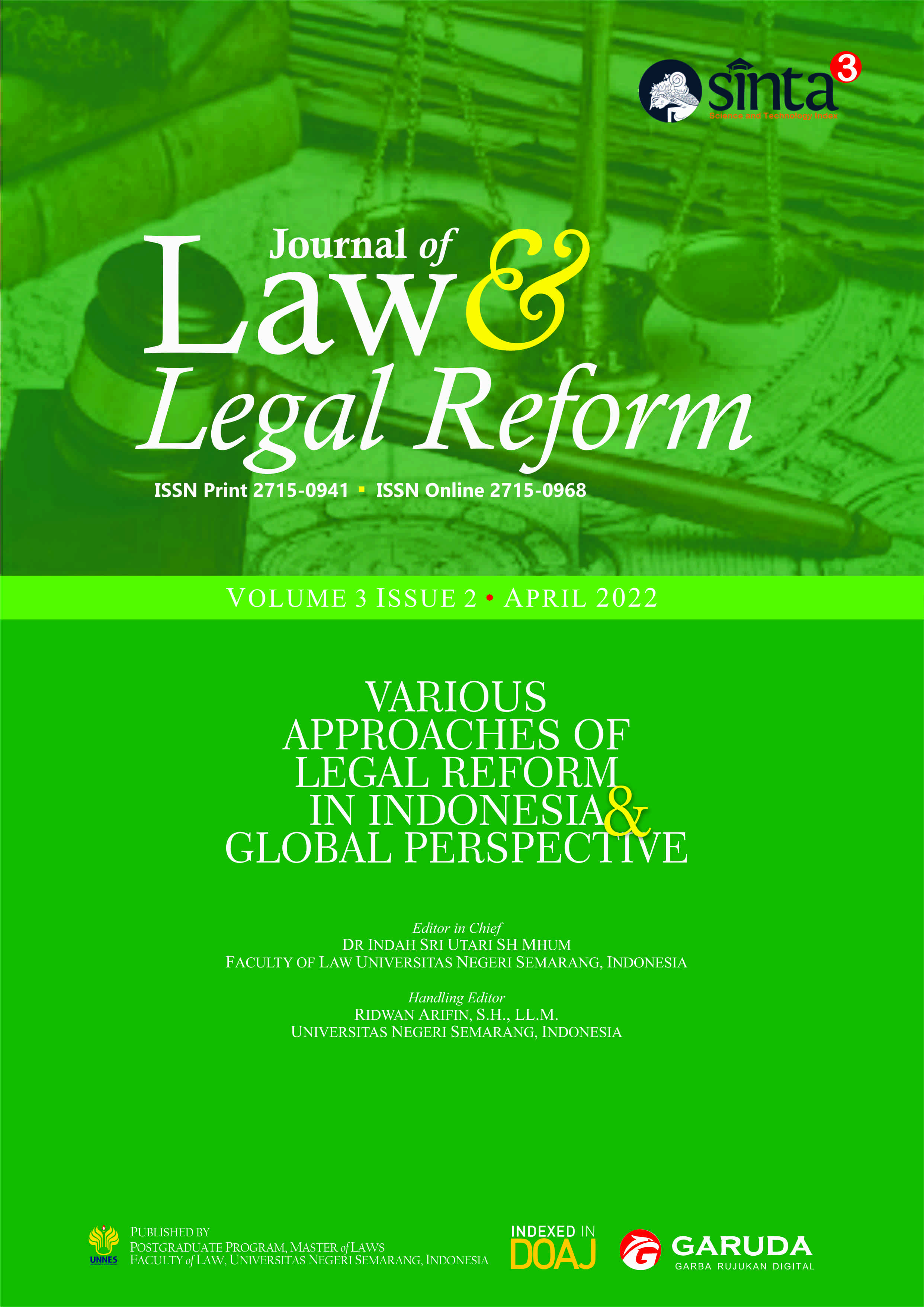Public Dialogue and the Good Governance: How can the community be actively involved in legal reform and good governance?
Main Article Content
Abstract
The purpose of this research is to determine how the Friday Dialogue was analyzed in terms of good governance during the leadership of the Bojonegoro Regent during the Kang Yoto era in 2008-2018. In this study, the concept of good governance, which was echoed by Kang Yoto, was examined to see if it fulfilled all or part of the elements of the concept of good governance and how it was actually practiced. This research is intriguing to investigate because it is still uncommon to find local government leadership models that apply the concept of good governance, particularly those that involve the people of the region directly. The descriptive qualitative approach was used in this study, with secondary data sources analyzed using interactive analysis. The descriptive qualitative approach was used in this study, with secondary data sources analyzed using interactive analysis methods. The Friday Public Dialogue is the result of this study, and it is a step taken by the Bojonegoro Regency Government to realize good governance in accordance with the mandate of Law Number 23 of 2014 concerning Regional Government. awards ranging from national to international levels. The public dialogue activity on Friday is essentially an activity that can support the synergy between the government, the private sector, and the community in order to achieve benefits for all parties and prosperity for all Indonesians, particularly those in the Bojonegoro area.
Article Details

This work is licensed under a Creative Commons Attribution-NonCommercial-ShareAlike 4.0 International License.
All writings published in this journal are personal views of the authors and do not represent the views of this journal and the author's affiliated institutions. Author(s) retain copyrights under a Creative Commons Attribution-NonCommercial-ShareAlike 4.0 International (CC BY-NC-SA 4.0).
References
Artandi, Ahmad Irgi Riza, 2018, “Partisipasi Masyarakat dalam Open Government Partnership (OGP) di Kabupaten Bojonegoro (Studi Kasus Dialog Publik)”, Jurnal Mahasiswa Universitas Negeri Surabaya.
Budisetyowati, Dwi Andayani, “Prinsip-Prinsip Good Governance dalam Pelayanan Publik”, Jurnal Hukum Universitas Tarumanegara, t.t.
Habibah, B. A., 2017, Efektivitas Dialog Jumat sebagai Model Pembuatan Kebijakan Publik Deliberatif di Kabupaten Bojonegoro. Universitas Airlangga.
Mohajan, 2018, Munich Personal RePEc Archive Qualitative Reseaerch Methodology in Social Science and Related Subjects Qualitative Research Methodology in Social Science and Related Subjects, Journal of Economic Development, Environment and People, 7(1).
Nawawi, J., 2009, “Membangun Kepercayaan dalam Mewujudkan Good Governance”, Jurnal Ilmu Pemerintahan, Vol. II, Nomor 1.
Prasetio, Dicky Eko, 2020, “Dua Sisi Dialog Publik: Antara Kebijakan Politik dan Polemik Keberlanjutannya”, ResearchGate.
Putra, Moch Ade Rachman, 2018, “Peningkatan Kepercayaan Publik melalui Pemerintahan Partisipatif”, Jurnal FISIP Universitas Airlangga.
Rasul, Sjahruddin, 2009, “Penerapan Good Governance di Indonesia dalam Upaya Pencegahan Tindak Pidana Korupsi”, Mimbar Hukum, Vol. XXI, Nomor 3.
Safarov, I. Dkk, 2017, Utilization of Open Government Data: A Systematic Literature Review of Types, Condotions, Effect, and Users, Information Polity, 22(1).
Simonis, Udo E., 2004, “Defining good governance: The Conceptual Competition is on”, WZB Discussion Paper, No. P 2004-005, Wissenschaftszentrum Berlin für Sozialforschung (WZB), Berlin.
Supriadi, Yadi, 2017, “Ruang Dialog Publik dan Pers Menurut Habermas”, Jurnal Kajian Jurnalisme, Vol. I, Nomor 1, ISSN: 2549-1946 (online) ISSN: 2549-0559 (cetak).
Tyasotyaningrum, Berlian, 2019, “Praktik Open Government melalui Partisipasi Publik di Kabupaten Bojonegoro dalam Mewujudkan Transparansi dan Akuntabilitas”, Mediasosian: Jurnal Ilmu Sosial dan Ilmu Administrasi Negara, Vol. III, Nomor 1.
Widodo, Joko, 2001, Good Governance: Telaah dari Dimensi Akuntabilitas, Kontrol Birokrasi Pada Era Desentralisasi dan Otonomi Daerah, Surabaya: Insan Cendekia.
UU Nomor 28 Tahun 1999 tentang Penyelenggaraan Negara yang Bersih dan Bebas dari Korupsi, Kolusi, dan Nepotisme.
UU Nomor 23 Tahun 2014 tentang Pemerintah Daerah.
